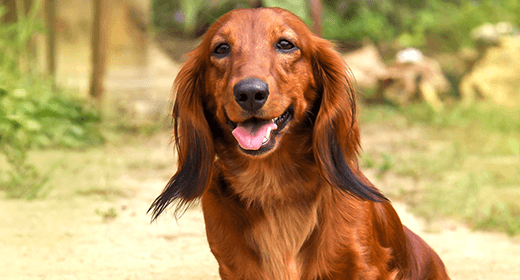

With so many choices, finding a good puppy food can seem outright daunting. Well, it’s about to get a little easier. Watch as Dr. Katy Nelson takes you through the ins and outs of puppy nutrition with information on everything from age appropriate dog food, to the importance of feeding schedules.
Hi, I'm Dr. Katy Nelson with IAMS. Today we're going to talk about dog nutrition, and what you should look for in your puppy's food. Just like infants, puppies require different levels of nutrients than older dogs. Physically, puppies grow fastest during the first six months. The right nutrition is critical to support this rapid growth. That said, your puppy should only receive premium puppy food until he reaches his adult height and weight. That's typically in the first year for small and medium breeds, and can be up to two years for large and giant breeds. One more thing to consider is that a puppy's energy requirements can be nearly twice that of an adult dog. And since their stomachs are smaller, they need more nutritionally dense food formulated just for puppies to help them meet their energy needs. There are three types of food: dry kibble, semi-moist—which comes in sealed packages—and moist or canned. Most veterinarians and trainers recommend dry kibble food, because of its fat content, and the fact that moist food can spoil. Dry kibble also helps with tartar control, which is particularly important for his developing teeth. When you're shopping for food, there are a couple of things you want to look for and keep in mind. Number one, look on the label for a statement that says, 'Formulated to meet the nutritional levels established by the AAFCO dog food Nutrient Profiles for growth.' Number two, read the ingredients list on the back of the package, and look for real meat as the first ingredient. Puppies grow the fastest during the first six months of life, and because growth rates differ among breed sizes, you need to feed a formula designed to address the needs of your puppy's breed and size. Ideally, puppy food should also contain animal based protein for strong muscles. The protein requirement for growing poppies is higher than that for adult dogs. High quality protein is critical for puppies to create new body tissue as they grow. Calcium for strong bones and teeth, iron for healthy blood, DHA for the brain, central nervous system, and vision. DHA is a key ingredient found naturally in mother's milk, and is important for a baby's neural development. Just like a baby, your puppy's ability to learn depends on healthy brain development. Prebiotics for healthy immune system, because 65% of your puppy's immune system is in his digestive tract, and high in calories for all the energy a puppy burns. The nutritional needs for puppies differ for different breeds sizes. Large breed puppies grow more quickly. Because of that, they actually need less calcium, so their bones don't grow too fast. Medium breed dogs need a careful balance of calories and nutrients to be sure that they don't gain excess weight, while small breed puppies need nutrient dense food in small bites, because their metabolism tends to be faster, and they have different energy needs than larger dogs. Another important thing to know is that what is good for humans is not necessarily good for animals. Because proper nutrition is critical for optimal development, and because human food doesn't offer the proper balance of nutrients puppies need, it is important to teach your whole family that feeding your puppy or your dog table scraps is a big no-no, and a major health hazard. Now let's talk about feeding schedules. Just like babies, puppies do best on a regular schedule. Schedules teach them that there are times to eat, times to play, and times to potty. Obviously, the feeding schedule will largely be dictated by your own personal schedule. But no matter what, it is critical that puppies younger than four months be fed multiple times per day. Depending on your puppy's breed size, at around six months, you can start to limit feedings to twice a day. Also, keep in mind that eating is soon followed by the urge to go to the bathroom. If you work away from your house and are unable to feed and walk your puppy as often as needed, think about hiring a dog walker, or ask a neighbor to help you keep your puppy on his schedule. For more information on house training, watch 'How to House Train Your Puppy.' Another important nutritional determinant is how much you're supposed to feed your developing puppy. Even though the back of the puppy food bags usually have suggested portion sizes based on weight, they are not always right for your puppy. So it's best to pay attention to your puppy's body and talk to your veterinarian. Remember, a fat puppy is not necessarily a healthy puppy. Just as childhood obesity can lead to adult health issues in humans, monitoring a puppy's weight is very important to ensure proper development. Treats are another food source to consider when determining portion size. It is important to limit treating to less than 10% of your puppy's daily caloric intake. When selecting treats, hard chew treats are ideal, because they improve dental health through gnawing. Also, try to save treating for training sessions to reward good behavior, but be careful not to overdo it. For more information on training, watch our video 'Puppy training basics.' The last part of puppy nutrition we are going to talk about is water. Puppies need fresh, clean water available at all times. Like us, it is their most important nutrient. You should change your puppy's water often, at least once a day. Providing fresh, clean water greatly reduces the risk of disease, and therefore keeps your pet happy and healthy. I'm Dr. Katy Nelson for IAMS, and I hope that you found this helpful as you welcome your new addition into your family.


Nutrients such as protein, fat, vitamins, and minerals are important players in the skin and coat health of dogs. To understand the role of these nutrients, it is necessary to start by understanding skin and hair.
The purpose of skin and hair is to block things from leaving (such as water or heat) or entering (such as viruses and bacteria) the body.
The hair coat is composed almost entirely of protein. If the animal's diet doesn't contain adequate protein quantity and quality, hair may fall out, or become dry, weak and brittle.
Skin is made up of squamous cells, flat cells tightly packed together. These cells have tough membranes that are composed of proteins and fats. Without proper amounts of these nutrients, cell membranes weaken, allowing water to escape and bacteria and viruses to enter more easily.
Proteins are found in both animal-based and plant-based ingredients. Animal-based proteins contain all the essential amino acids dogs need, whereas plant-based proteins may contain only some essential amino acids. Animal-based proteins help dogs achieve optimal health.
Fats can also be found in both animal-based and plant-based ingredients. They are incorporated into skin cells as fatty acids. There are two essential fatty acids for skin and coat health. Linoleic acid maintains skin and coat condition in dogs. Without enough linoleic acid dogs may experience dull, dry coat, hair loss, greasy skin and increased susceptibility to skin inflammation.
Both of these essential fatty acids are omega-6 fatty acids and are found in animal tissues like chicken fat. Linoleic acid is also found in some vegetable oils, such as corn and soybean oils.
Most commercial dog diets contain more than adequate amounts of omega-6 fatty acids. Because these fatty acids can be converted to compounds that increase susceptibility to skin inflammation, it is important to balance the amount of omega-6 fatty acids in the diet with omega-3 fatty acids, which reduce susceptibility to inflammation.
Omega-3 fatty acids are found in oils from fish and some plants (canola and flax).
IAMS research has found that combining fat sources in the diet at a ratio of 5-10 omega-6 fatty acids to 1 omega-3 fatty acid results in excellent skin and coat health.
Vitamins and minerals are essential for the development of healthy skin and hair coat. The best way to provide these nutrients is through a complete and balanced diet containing appropriate amounts of essential vitamins and minerals rather than through supplements.
| Vitamin or Mineral | Importance to Skin and Coat Health |
|---|---|
| Vitamin A | Necessary for growth and repair of skin |
| Vitamin E | Protects skin cells from oxidant damage |
| Biotin | Aids in the utilization of protein |
| Riboflavin (B2) | Necessary for fat and protein metabolism |
| Zinc | Necessary for fat and protein metabolism |
| Copper | Involved in tissue pigment and protein synthesis |
Diet is often believed to be a factor when changes in skin and coat condition are noticed. The most common causes of these changes, however, are season and life stage.
As cold weather approaches, most dogs grow a thick coat to help keep heat in and cold air out. As the weather begins to warm up, they shed the thick, heavy coat.
Most puppies are born with soft fuzzy hair, but as they age, a coarser coat grows. Pregnant or lactating dogs also may experience a change in coat condition or hair loss. And, as with humans, the hair on dogs may thin out and become coarser and white as they reach their senior years.